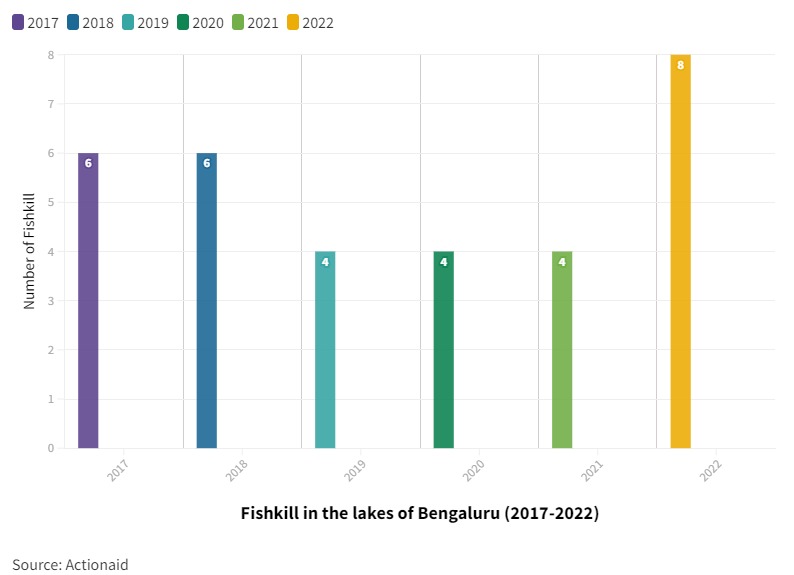Eight fish kills have happened in the last seven months in Bengaluru; departments concerned are yet to take proper measures.
In the last seven months, there have been eight fish kill incidents across the lakes of Bengaluru. which is raising concerns about preservation of aquatic life. However, the departments concerned are saying, it is a regular occurrence.
“Fishes die every year and it is nothing new, the major issue is not with Bengaluru, but with other parts of Karnataka,” said Shashi Kumar, Chief Engineer at the Lake Department of Bruhat Bengaluru Mahanagara Palike (BBMP). He said that fish kill incidents in Bengaluru do not happen regularly. However, this time due to the floods, the sewage water overflowed into the lake, and as a result several fish died.
Data from a report released by ActionAid shows there had been 32 fish kills in the last five years. This year within the last eight months, eight fish kills have already taken place. The findings of the report show that 51 percent of fish kills occurred due to the mixing of sewage water into the lake, where 23 percent constitutes toxin and chemicals and the remaining 26 percent is industrial effluent and pesticides from sewage treatment plants.

2022 witnesses increase in Fish kill instances as compared to past 5 years.
Raghavendra B Pachhapur, Programme Manager at ActionAid Association said that “Eight fish kill were witnessed before monsoon this year and post monsoon 32 lakes are in bad condition, I am afraid more lakes can fall prey to fish kill this year,.” He added that several fish died in Haralur lake because of sewage water mixing into the lake water due to the recent floods. Previously the same incident happened in Kothanur, Yelachenahalli, and five other lakes. BBMP should start monitoring the lake quality regularly, he said.
Changappa, a resident, who goes for a walk daily to Kothanur Lake said that the BBMP officials do not inspect the lake frequently. “We complain to the BBMP whenever we notice irregularities and they come and clean the lake, otherwise they do not come,” he said. He also said that after the immersion of Ganesha idols in the lake, they have observed a layer on the surface of lake.“I do not know whether it is just some paint or any chemical,” he said.
Sashi Kumar said, “We are making diversion channels to separate sewage from lake water to stop pollutants from entering lakes, however, it is the responsibility of Bangalore Water Supply and Sewerage Board (BWSSB) to clean the sewage water.” The BWSSB department officials on the other hand refrained from commenting.
Shashi Kumar also added that cleaning is done whenever they see weeds and garbage in lakes, and that there are four to five people for every developed lake who clean it. Under the Amrit Nagrothana Yogna, Rs.229 crore was allocated to the BBMP for lake cleaning and not Rs.317 crore, as mentioned on BBMP lake department website, he said. A Regional head of Karntaka State Pollution Control Board (KSPCB) said, “We have written to the government to install sewage treatment plant (STP) at the entry point of every lake where the channel merges with lake water.” He said there are multiple reasons for fish kill, but, the actual reason is unknown. However, Srinivasulu, a member secretary of KSPCB said that they are still investigating the incidents.
T.V Ramachandra, Scientific Officer and a specialist in soil and water pollution at the Indian Institute of Science, Bangalore said that the root cause of fish kill is letting of untreated water into the lakes, as it increases ammonia level in the water, “This is not just affecting water bodies but humans too as heavy metals are found in food.. The industrial effluents are getting into the lakes and people are using the same water for growing vegetables downstream from Belandur,” he added.
He also said that the BBMP department should monitor the lakes frequently, and should be held accountable for the incidents and irregularities in lakes.



